Google’s guidelines for using AI-generated content on your website
Will Google penalise your website for having AI-generated content? What are the Do's and Don'ts, and what is Kontrolit's policy?

Kontrolit constantly adapts its SEO strategies. Now we’re adapting again, ensuring your websites thrive in an AI-driven environment online.
Search engines have changed dramatically in a remarkably short time. As digital marketers, we’re used to this fast-paced evolution, but we think it's important for you to understand what's changed and how our shifting SEO strategies affect you.
Of course, we’re talking about artificial intelligence (AI), how it is increasingly baked into the way search engines work and how it affects websites like yours. Let’s dig in!
Traditionally, a successful SEO outcome could be summed up as:
Helping a website outrank its competitors to get the click.
Your competitors were other businesses vying for the same customers. Clicks came from straightforward links in Google Search. Life was simpler…
Your competitors are no longer limited to other businesses. Search engines themselves, alongside AI platforms like ChatGPT, Perplexity, and Gemini, are also vying for user attention. Opportunities to "get the click" are shrinking faster than a chocolate Wagon Wheel.
Google’s “traditional” search results have changed drastically. Organic links to websites are pushed further from view by prominent features that aim to answer the user queries directly on the Search page.
No click to website necessary. You lose.
We call these “zero-click searches”, and they’re having a significant impact on organic traffic for many websites. Some examples you’ll probably recognise:
AI Overviews
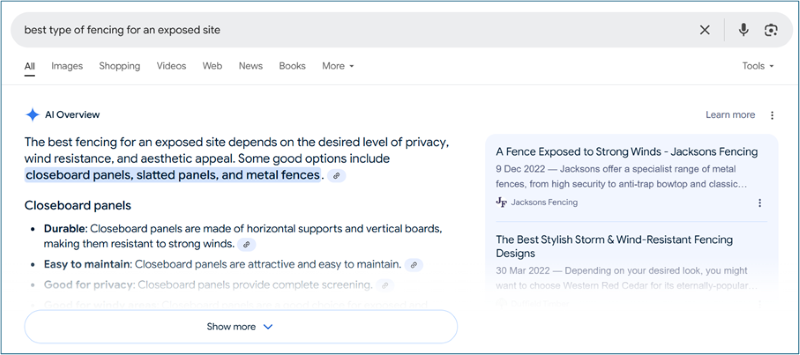
People Also Ask feature
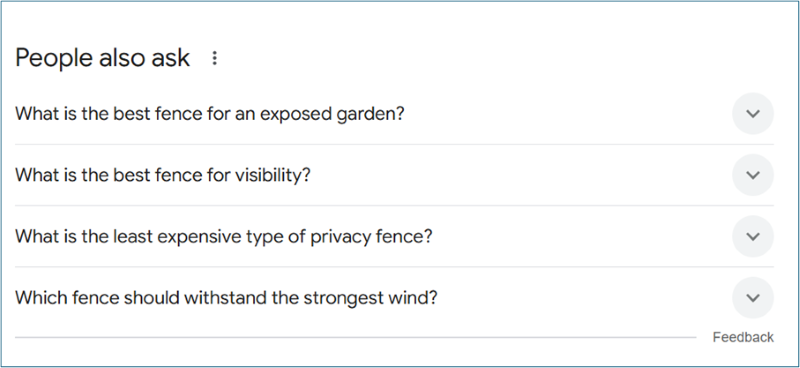
Featured Snippet example
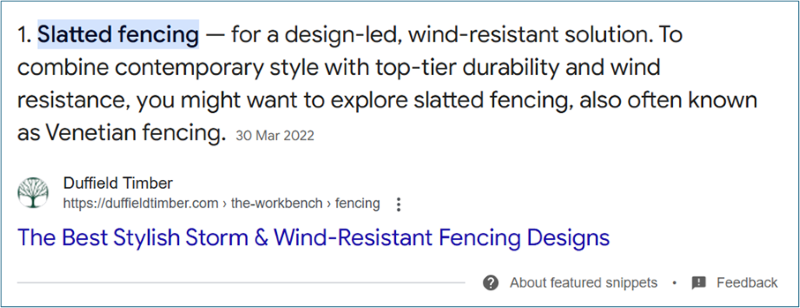
Direct Answer box
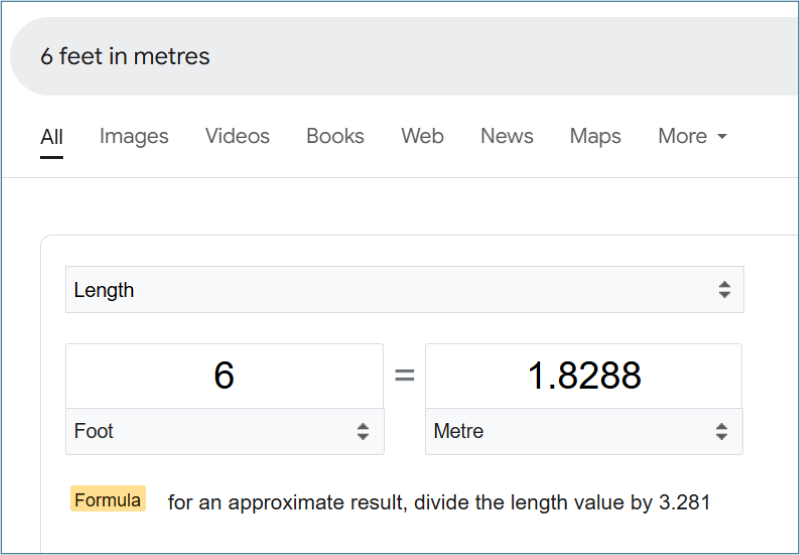
Knowledge Panel example
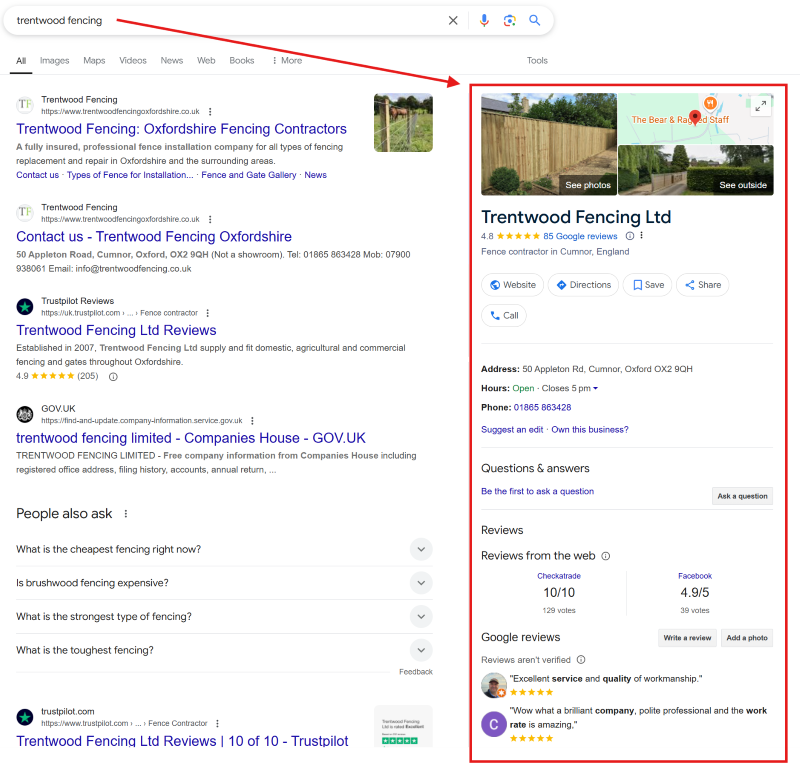
The irony is, these zero-click features often source their responses from content on websites like yours, yet the clicks they generate are minimal. Meanwhile, ads also dominate the visible space, reducing organic traffic even further. In other words, they’re eating your cake, sharing it around, claiming the kudos and leaving you with the crumbs.
If Google is using your site as a source for an AI overview, at least that must mean it rates the value and quality of your content?
Correct, but that doesn’t mean you’re going to get the click. In fact, research has shown that:
Around 60% of all user searches in 2024 were zero-click.
Findings from audience research software company SparkToro.
Google has no incentive to change this. Sending free traffic to websites isn’t how Google makes money.
Frustrating? Yup! However, Google still has around 90% share of the search market (or more depending where you get your news), so it would be irresponsible to simply ignore them as a search engine.
AI tools like ChatGPT and Perplexity, known as Large Language Models (LLMs), are reshaping search behaviours.
LLMs are AI programs that have been trained on vast amounts of data (including your own website content). Like Google, these tools can satisfy users’ queries without directing them to your site.
Despite all the excitement around AI tools (fully justified, by the way; they’re a giant technological step forward), their current impact on traffic remains low at the moment; however, they are gaining traction, so our SEO tactics need to get ahead of mass adoption.
Some loss of traffic is inevitable due to these shifts but here’s how we’re adapting to defend your online visibility, whether it's in Google search results or a third-party AI tool.
While AI excels at providing quick answers, many searchers still seek deeper, more detailed insights that AI algorithms often can’t deliver. These situations include:
We’ll focus on creating this type of rich, authoritative content to ensure your website stands out when there's a better opportunity to get the click. We'll need help from your industry expertise to make it really authentic.
We’re prioritising content that’s:
For ecommerce sites, product pages will need to shine, with:

Some marketers are flooding the web with shallow, AI-generated content. Others are using AI tools responsibly, making better content, not more content.
While Google mostly filters out low-quality material, there are growing concerns that the quality of search results is at a low point right now. To rise above this, we’ll focus on what AI can’t easily replicate:
First ask yourself, what can a human do that AI can’t?
These elements resonate with real people, start conversations, build trust and earn a following. And incidentally, they also align with Google’s quality guidelines. Added to which, research in 2024 by Orbit Media Studios suggests that human-generated content with these qualities performs better than AI.
Let’s turn these principles into some practical examples.
If AI chatbots become a major channel for searchers, will they send traffic to websites? Yes; in fact it’s already happening, as this screenshot from a Google Analytics account shows:
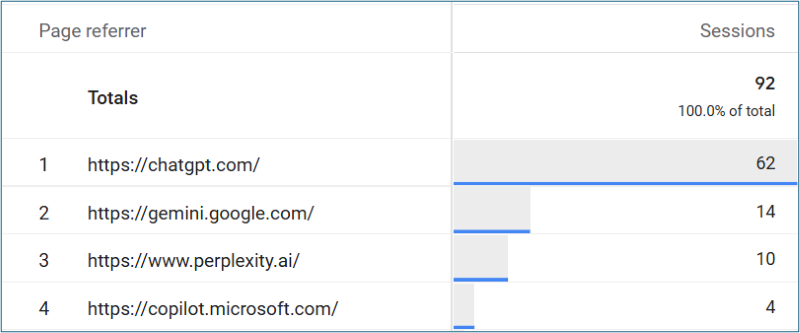
I decided to go straight to the horse’s mouth, so I asked ChatGPT this very question: “How do you choose your citation sources?”
Caveat – Much like Google’s ranking algorithm, I wouldn’t expect ChatGPT to divulge its inner workings to just anyone. Never-the-less, we shared an interesting conversation (which I’ll be writing about in a follow-up article), and much of what it outlines seems logical.
In fact, if its response can be believed (and I've no reason to think it's programmed to lie) ChatGPT seems to use many of the same SEO signals that we optimise for in Google:
ChatGPT also suggested some key differences to Google that might help a website become a cited source.
“By focusing on these strategies, your website becomes more visible and credible, increasing the likelihood that I’ll encounter it when researching answers. If your content is high-quality and relevant, it may be selected and cited in my responses.”
ChatGPT response, January 2025
Some site-owners block AI bots to stop them scraping their content. I empathise with the moral principle, but just like search engines, if an AI bot can’t crawl your website, it can’t mention it in an AI answer and you lose an opportunity to drive targeted traffic.
It’s your choice: you can do the same or you can prepare for the day – not too far away – when AI bots could be valuable visitors.
Strengthening the working partnership between our SEO team and our customers is key. The success of these strategies relies on collaboration. While there is plenty that we can work on independently, your industry expertise, case studies, customer feedback, and unique insights are essential. We’ll be reaching out to you regularly to gather these materials, ensuring your website stands apart from AI-generated mediocrity.
We appreciate the extra effort this involves on your part, and hope you agree it's a worthwhile contribution.
We're keeping our finger on the pulse of this rapidly changing environment (though at this rate we might need a defibrillator! ). There’s no magic formula that will entirely prevent the effects of zero-click searches. Only a snake-oil salesman would pretend otherwise.
However, by focusing on quality, human-centric content and embracing new opportunities, we can navigate this new landscape successfully.
Got questions? Let’s chat!
Will Google penalise your website for having AI-generated content? What are the Do's and Don'ts, and what is Kontrolit's policy?
Buying a website is a big investment, so why are so many people disappointed with the impact it has on their business after it’s launched?
Give us a call on 01935 434734 or email us at hello@kontrolit.net and one of our team members will be happy to help.
Alternatively, click on the button below to fill out a contact form and we will get back to you on your preferred contact method.